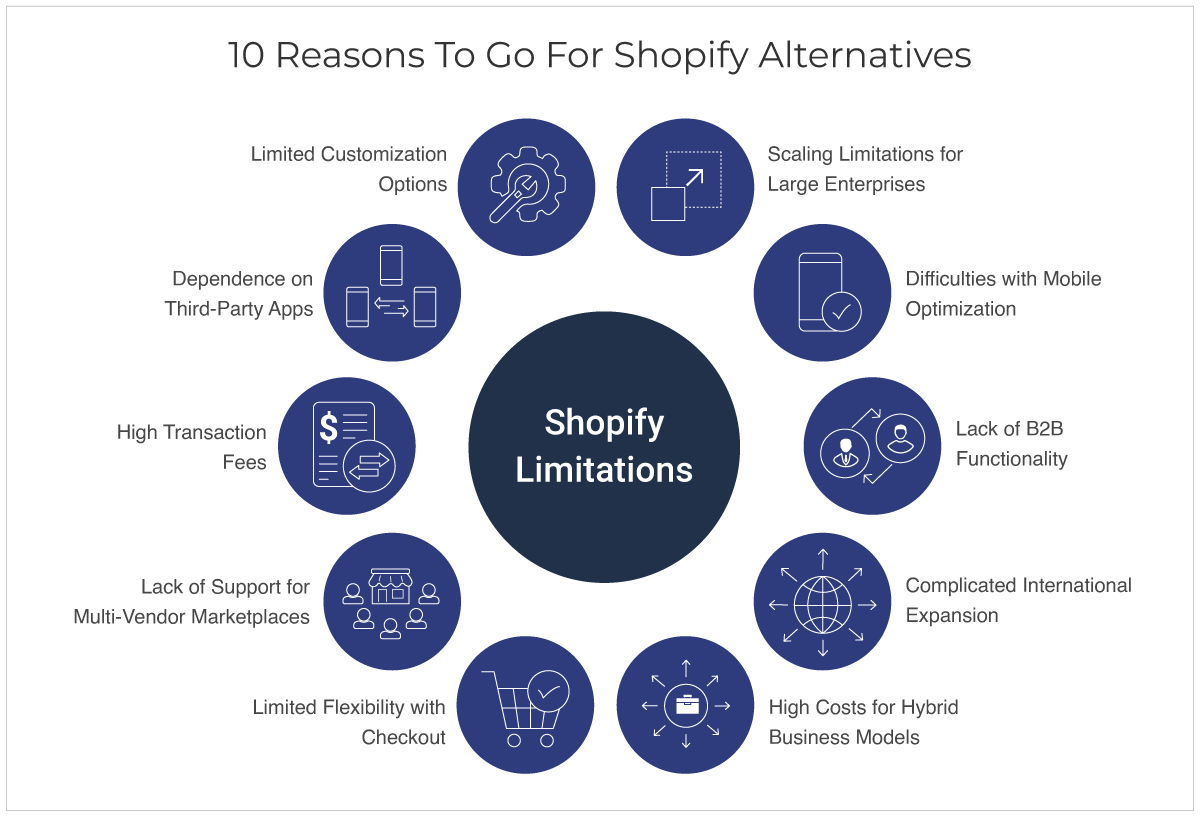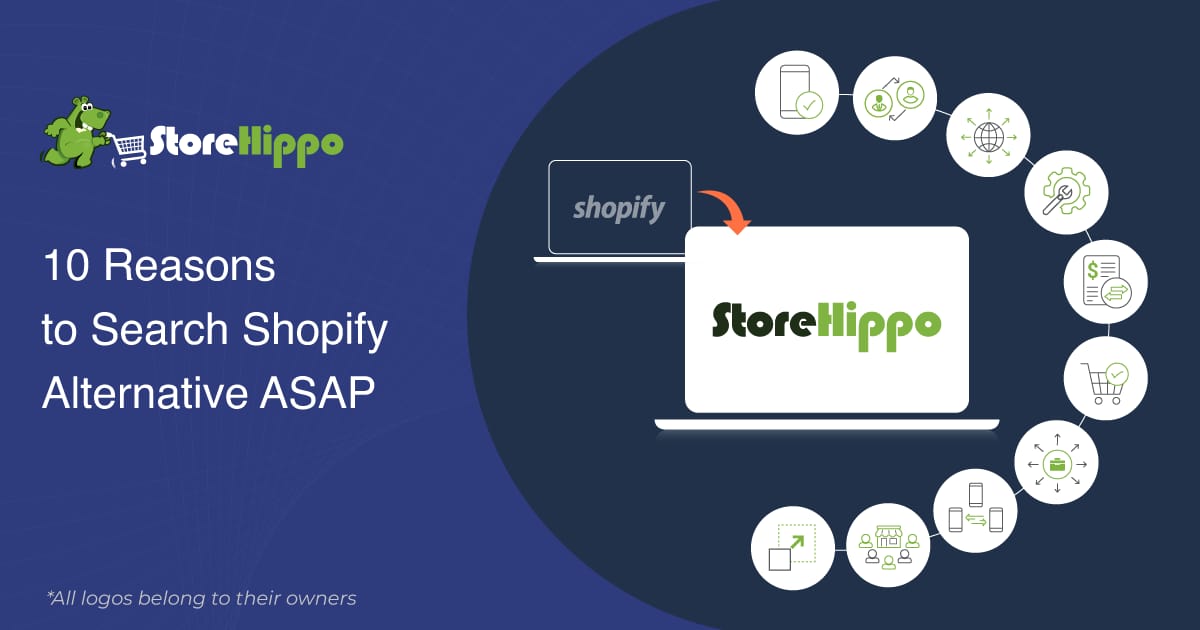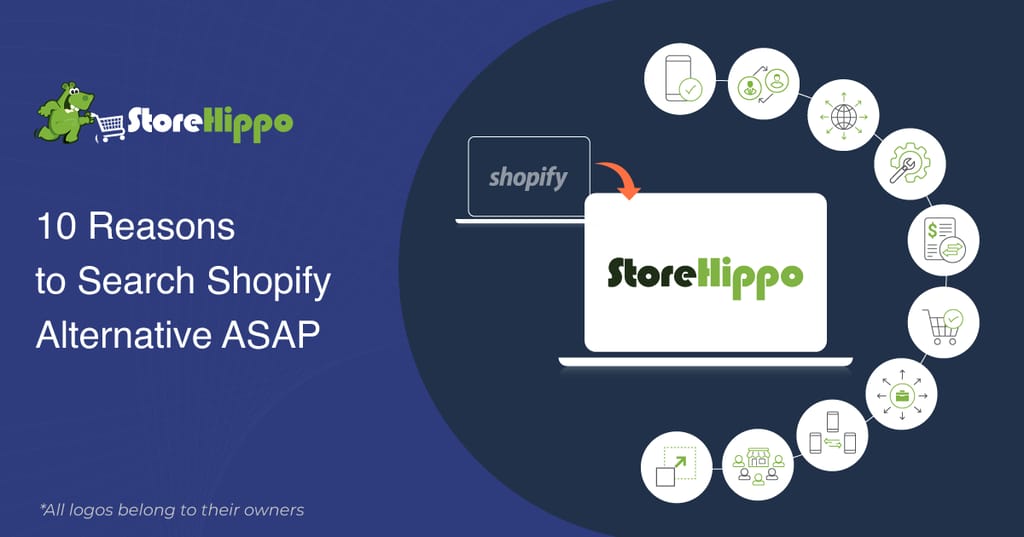As your business grows, your eCommerce platform should be able to keep pace, right? Imagine growing rapidly on Shopify and then being hit by challenges that force you to search Shopify alternatives.
Well, this is the story of many enterprises in India.
While Shopify has built its reputation as a go-to option for many, it often leaves enterprises feeling boxed in. Indian enterprises have been reporting a growth slow down by rigid customization limits, soaring transaction fees, and a platform that just won’t scale as fast as you need.
Frustrating, isn’t it?
The truth is, as businesses reach a certain point, Shopify’s cracks start to show. And when those cracks turn into roadblocks that hinder your growth and efficiency, you’re left with no choice but to search for a better alternative.
So, what are these critical issues that push businesses to jump ship?
Table of Contents
- 10 Unavoidable Issues That Force Enterprises to Find Shopify Alternatives
- 1. Limited Customization Options
- 2. Scaling Limitations for Large Enterprises
- 3. Dependence on Third-Party Apps
- 4. Difficulties with Mobile Optimization
- 5. High Transaction Fees
- 6. Lack of B2B Functionality
- 7. Lack of Support for Multi-Vendor Marketplaces
- 8. Complicated International Expansion
- 9. Limited Flexibility with Checkout
- 10. High Costs for Hybrid Business Models
- Conclusion
10 Unavoidable Issues That Force Enterprises to Find Shopify Alternatives
Let’s take a closer look at 10 reasons why your enterprise brand should start seeking out Shopify alternatives.

1. Limited Customization Options
Shopify offers limited customization without costly third-party apps or custom development. This makes all of the Shopify stores look similar, not giving any edge to brands looking to create their niche.
Here are the reasons that force brands to look for Shopify alternatives:
- Lack of brand differentiation with cookie-cutter themes.
- Restricted changes to checkout flow and user experience.
- High dependency on paid apps for essential features.
- Compromised user experience due to limited customization options.
- Additional development costs to customize complex features.
StoreHippo offers extensive customization options with built-in themes and an easily customisable enterprise ecommerce platform that can be tweaked inside out to suit your brand's unique requirements. This ensures businesses can easily differentiate themselves and provide personalized user experiences without relying on expensive third-party developers.
2. Scaling Limitations for Large Enterprises
Shopify’s infrastructure doesn’t always scale smoothly for large-scale enterprises. As traffic surges and product catalogs grow, Shopify’s performance can start to falter, leading to slower load times and frustrating user experiences. For large-scale enterprises, this can mean missed sales opportunities and a dip in customer satisfaction, making scalability a serious concern.
This leaves no room but to to look for competitor Shopify enterprise solutions that can offer solutions for following issues:
- Frequent performance issues during high-traffic periods.
- Limited control over server resources and scaling.
- Expensive Shopify Plus plans for larger businesses.
- Slower load times as product catalogs grow.
- Solve the difficulty in managing large volumes of data without expensive solutions.
StoreHippo is built to scale effortlessly with enterprise needs, whether it’s handling high traffic volumes or expanding product catalogs or reaching new geographies. With its cloud infrastructure, StoreHippo can easily accommodate growing businesses without performance degradation or the need for expensive upgrades. With its ability to easily accommodate vertical and horizontal growth of enterprises, StoreHippo shines as the best Shopify alternative for enterprises.
3. Dependence on Third-Party Apps
Shopify is built on an app-based infrastructure. Many essential features in Shopify require third-party apps, driving up costs and forcing enterprises in India to start looking for Shopify alternatives.
The primary reason for moving to competitors of Shopify are:
- Extra app fees that increase operational expenses.
- Risk of app conflicts causing performance issues.
- Over-complication of store management with multiple app dependencies.
- Reliance on external developers for app updates and support.
- Higher vulnerability to security issues from multiple third-party apps.
StoreHippo offers an all-in-one solution with native features, reducing the need for third-party apps. Whether it’s advanced SEO tools, marketing automation, or multi-vendor support, StoreHippo integrates everything within the platform, saving costs and simplifying management.
4. Difficulties with Mobile Optimization
Ecommerce is predominantly mcommerce now with more than 60 percent orders across industries coming through mobile channels. To explore the potential and reach of m-commerce brands need solutions that have a mobile-first approach. Shopify is not inherently mobile-first, requiring additional efforts for mobile optimization.
Enterprises look for Shopify alternatives as they face the following challenges:
- High bounce rates due to slow mobile page load speeds.
- Increased development costs to create mobile-responsive designs.
- Poor mobile shopping experience leading to lost sales.
- Difficulty in optimizing the mobile checkout process.
- Inability to deliver mobile-first experiences without additional apps.
StoreHippo is mobile-first by design, ensuring all stores are fully optimized for mobile devices out of the box. It also offers Progressive Web Apps (PWAs), enabling businesses to deliver fast, app-like experiences on mobile without any additional costs or development. Storehippo mobile apps builder requires no coding or additional cost to build Android and iOS apps making it the best Shopify alternative for enterprises.
5. High Transaction Fees
One of the biggest grudges enterprises have with Shopify is its high transaction fees and lack of local payment solutions for different countries. Shopify charges additional transaction fees unless using Shopify Payments.
Shopify enterprise solutions do have Shopify Payments option but it becomes a costly affair due to:
- Extra costs when using third-party payment gateways.
- Increased operational expenses cutting into profit margins.
- Difficulty in scaling due to rising fees with higher sales.
- Strain on cash flow due to unexpected transaction charges.
- Inability to offer diverse payment options without incurring extra costs.
StoreHippo doesn’t charge any transaction fees for using third-party payment gateways, unlike Shopify. You can integrate popular local and global payment gateways seamlessly and offer your customers a variety of payment options. Also StoreHippo integrates with 60+ domestic and international payment gateways helping your business choose the best ones for your brand.
6. Lack of B2B Functionality
Shopify is primarily B2C-focused and lacks robust native B2B tools. This often leaves gaps in functionality for enterprises requiring specialized features like bulk ordering, price negotiations, and account management. As a result, businesses operating in B2B sectors may have to check on Shopify alternatives that can offer capabilities for managing complex, multi-layered transactions and relationships.
Here are some limitations that compel enterprises to check on alternatives:
- Inability to offer tiered pricing and bulk discounts.
- No native support for customer-specific catalogs.
- Difficulties in managing B2B sales workflows without third-party apps.
- Increased costs due to reliance on external solutions.
- Missed opportunities to streamline wholesale operations.
StoreHippo has native B2B features such as bulk ordering, tiered pricing, and customized solutions for catalogs. It allows enterprises to easily cater to wholesale buyers and manage complex B2B workflows without the need for third-party apps, making it ideal for businesses with dual B2B and B2C models.
7. Lack of Support for Multi-Vendor Marketplaces
The growth of B2B ecommerce is driven by B2B marketplaces that that cater to the specific needs of industries by providing specialized platforms for bulk transactions, tailored pricing strategies, and comprehensive supply chain management. Shopify doesn’t natively support multi-vendor marketplaces without third-party solutions making it necessary to look for Shopify competitors that enable brands to build and launch wholesale marketplaces quickly.
Here is the main reasons why enterprises look for Shopify like platforms:
- Additional costs to implement marketplace functionalities.
- Complex integrations leading to poor user experience.
- Limited vendor management features for admins.
- High maintenance costs for marketplace infrastructure.
- Difficulty scaling the marketplace without native support.
StoreHippo provides built-in multi-vendor marketplace functionality, allowing businesses to create and manage marketplaces with ease. Features like vendor-specific dashboards, commission management, and payout systems are included, making it a seamless solution for businesses looking to scale as a marketplace.
8. Complicated International Expansion
After a certain level of growth in domestic markets, enterprises often explore the options for building a global presence. To easily do this they need an advanced enterprise ecommerce platform that comes with built-in features to take the business to global markets. Shopify's multi-currency and localization tools are often limited for global scaling.
Here are the top reasons why enterprises are compelled to explore Shopify alternatives:
- Lack of seamless currency switching for international customers.
- Difficulties in managing taxes and regulations across countries.
- High costs for building region-specific stores.
- Limited support for global logistics and shipping integrations.
- Increased complexity in managing localized content and promotions.
StoreHippo supports multi-currency and multi-language functionalities out of the box, making international expansion straightforward. It also integrates with global logistics and has a powerful tax engine enabling enterprises to manage operations smoothly across borders without the need for custom solutions.
9. Limited Flexibility with Checkout
Modern buyers need hassle-free payment options that offer them choices. Also, customized checkout flow is a great way to boost customer engagement and eventually conversions. Shopify restricts businesses from customizing the checkout process if they are not using Shopify Plus.
Here are the top difficulties that force enterprises to look for Shopify alternatives:
- Inability to modify checkout steps for a streamlined experience.
- Missed opportunities to add upsells or custom fields in checkout.
- Dependency on Shopify’s rigid checkout structure for payment options.
- Increased cart abandonment rates due to an unoptimized checkout flow.
- Lack of control over critical elements in the customer journey.
StoreHippo makes it possible for brands to customise the checkout process for different buyer groups by adding multiple payment channels. Businesses can tailor the checkout flow to optimize user experience, add upsells, and reduce cart abandonment, offering greater control over conversions compared to Shopify’s rigid checkout structure.
10. High Costs for Hybrid Business Models
Shopify's platform, primarily designed for straightforward B2C operations, often falls short for businesses operating under hybrid models that blend B2B and B2C functionalities. The lack of integrated features to seamlessly manage both business types leads to operational inefficiencies and higher costs. Brands operating these hybrid models frequently encounter several significant issues that necessitate the search for alternative platforms.
Issues compelling brands to look for Shopify Alternative Platforms:
- Shopify's limitations in handling complex pricing structures for B2B and B2C transactions.
- Lack of native support for differentiated access controls necessary for wholesale and retail operations.
- Difficulties in simultaneously managing bulk B2B orders and individual B2C sales efficiently.
- Challenges in integrating Shopify with essential ERP systems and tools for hybrid operations.
- Increased expenses due to high fees and the need for third-party apps to bridge functionality gaps.
StoreHippo comes with built-in support for many business models like B2B, B2C, D2C, B2B2C, hyperlocal commerce, quick commerce, and any other disruptive business model. With StoreHippo, enterprises benefit from flexible pricing setups, advanced user role customizations, and robust order management systems tailored for complex business operations. The platform supports seamless integrations with various ERP systems, enhancing operational coherence and reducing the need for costly third-party apps. By providing these integrated solutions, StoreHippo enables businesses to efficiently manage their hybrid models, ultimately reducing operational costs and complexity.
Conclusion
These 10 critical issues can significantly affect the growth and efficiency of enterprises using Shopify, leading them to seek better alternatives. From the limitations in customization and scaling to the high costs associated with advanced features, Shopify can be restrictive for businesses aiming for long-term success.
Enterprises need Shopify alternative platforms that provide flexibility, scalability, and cost-effectiveness without heavy reliance on third-party solutions. This is why many businesses turn to Shopify competitor enterprise ecommerce platforms that address these challenges while offering more comprehensive support for their growing needs.
Ready to move to a smarter and advanced Shopify alternative enterprise ecommerce solution? Start your 14-day storeHippo trial now.





















Leave A Comment